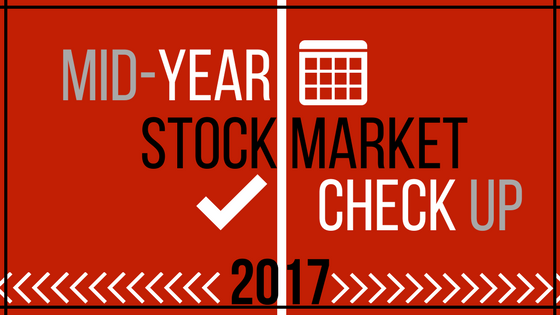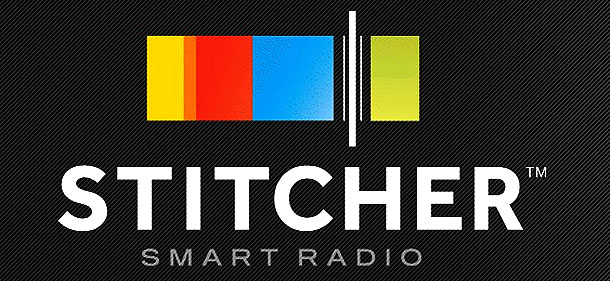We are in the second half of 2017 – right at the halfway mark. It’s time for your 6 month checkup! You should treat your financial goals and your stock trading goals like you do your health. It’s a good idea to stop what you’re doing and see if you are on the right track.
You can also listen to the podcast on these platforms by clicking the icons:
Are you following that exercise routine you said you were going to stick to at the beginning of the year, are you eating the right foods that you said you were going to at the beginning of the year and, much like going to the doctor to get a six month check-up, you should stop and check in and ensure your finances and trading are in good health.
In this episode, I want to discuss a few things you should be checking up on, the adjustments you can make if you are off-course and what to do to stay on course if everything is going well.
So at this point in the year, the market has been pretty good to us from a bullish standpoint and there has been money to be made. Now there are three types of people or categories you will fall in as we look at the halfway mark:
1.) Type One – those of you who started the year with no plan
2.) Type Two – someone who had a plan and has gotten of track a little bit or decided to deviate on purpose
3.) Type Three – those of you who had a plan and followed it, and things are working well and you want to ensure you stay on track or enhance what you’re doing
Category 1: No Plan
If you started the year with no plan you maybe looking back like: “Where has the time gone?” It’s six months gone, and perhaps you’re no closer to your goals. You had goals set but you had no specific plans to achieve them. (Now in this case I’m talking about with respect to the stock market.)
Often people say, “This is my year! I’m going to learn about the stock market, I’m going to learn how to have my money work for me” and that’s great, it’s exciting, you made a declaration… but with no plan you find yourself six months later no further than when you initially made your declaration back on December 31st.
Now if that’s you, here’s what I want you to focus on at the six month mark: At some point after listening to this podcast I want you to take inventory on your knowledge, tools and finances. These are your big three rocks to focus on.
1.) Knowledge, ask yourself: Do you have a trading or investment account? If not, start there. Once you know how and where to open a trading account, the question now becomes: Do you have the knowledge of what to buy, when to buy, how to buy and why to buy? For example, when you open a checking account, the first thing you need to do is open an account. But if you don’t know how to set a budget or balance a check book, you are more likely to stop doing it or try and calculate in your head, make a mistake, then realize there are important steps first. Same with the stock market, the knowledge is important.
2.) What tools do you need? Tools can come in the form of what I like to call coaching, courses and community. What courses do you need to take to start to learn how the industry works and how to make it work for you? Who do you need to be around to be able to share your journey with, who can walk with you, who has been down the road you have been down? On this road to financial freedom, or anything new, you need people to talk with about your journey and that’s what we provide inside of Power Trades University.
3.) Finances – this is a big one for whose who started the year with no plan and here’s why: if you started the year with no plan, it’s likely you spent a lot of money during the holiday season on Christmas gifts and spent the next six months paying them off, possibly on credit cards… now I know this is a touchy subject, but the reality is most people do not have a plan for their money, so when it comes time for the education or tools or having money to get started in the stock market they simply do not have any. If you take the holiday season out of the picture the other thing is most people live right up to their income line and sometimes above it – so there is no extra money to invest.
For this 3rd scenario for those of you who didn’t start out the year with a plan it’s a good time to draw a line in the sand and say, “The second half of the year doesn’t have to be like the first half of the year”. I recommend taking a piece of paper and drawing a line down the middle on one half you write “100% absolutely a necessity” on the second half I want you to write “I could live without for a short period of time”. The goal here is to find out what you could live without, what could you sell to help you get into the game. Maybe you have every type of cable TV service our there or spend a lot on coffee or go shopping a lot, whatever it is that you could tighten up on. You may even want to look at what you can sell, what if there is $500-$1,000 worth of stuff laying around that you don’t even need? You are looking to raise two types of capital… knowledge capital and trading capital.
Category 2: You have a plan
If you are in category 2, you are a step ahead of the person in category no. 1. You have already thought about this year and where you want to be, set a goal to take certain courses or learn the information and you purchased the courses, set aside some money to start trading or investing in the market… Good for you.
Here’s your task at the six month mark:
Now that you have some knowledge and some experience, I want you to ask yourself the following questions:
1.) Based on my financial goals, do I need to adjust the realistic time frame It’s going to take me to get there?
2.) Based on my financial goals, do I need to adjust how much capital I am going to need to get there?
3.) Based on my current education and experience in the market, is it time to learn my next skill to take my trading to the next level?
Let’s dive deeper into why these questions are important.
1. See at the beginning of the year you may have come in and said: “My goal is to be a full-time trader or investor by the end of the year.” Now sitting here at the six month mark, you may realize it takes a lot more than six months to just completely replace your income. I don’t know what your financial goals are, but you may realize it will take 3-5 years. Reflecting and adjusting will keep you from getting frustrated or, even worse, quitting before you hit your goal. I can’t tell you how many people get started in this industry and six months later they stop and I’m thinking, “Did you really think all it would take is 6 months to buy your dream house, walk away from your job or, the more famous line, become a ‘millionaire’?” I love the ambition, but after six months you may realize it takes a bit longer than that. In the beginning, you are excited and have lofty goals, now you realize it just may take some more time.
“Most people overestimate what they can do in a year, and they underestimate what they achieve in a decade”
-Tony Robins
2. Based on your financial goals, do you need to adjust how much capital you need to reach them? For example, you may be doing a consistent 10% return a month on $5,000 which means you are bringing in an extra $500 a month. However, if your goal is to replace a spouse’s income who makes $2,000 a month, you realize, “Okay we need to get our account to $20,000 and if we can stay consistent with the 10% return then we can bring one spouse home to be with the kids”. It isn’t necessarily about how much more you can squeeze out of your trades, but how can you keep doing what you’re doing, but with more money in the account?
3.) With your current education and experience, is it time to learn a new skill? For instance, the market has been bullish so just buying stocks or buying call options have been working, but lately the market has been volatile and we had to start looking at put options and other strategies. So the question is: Are you prepared for different market conditions? We all know the market can move three ways: up, down, and sideways, so are you prepared with the knowledge and a game plan to make money in all three scenarios? It may be time to learn options or advanced option strategies which could be the difference between staying off track or getting back on track and even ahead of the game.
Category 3: Life is good and all is going well….
Alright so you planned your trades and traded your plan. In this category at the 6 month mark, it’s a good idea to reflect on the trades you made the ones that worked and the ones that didn’t work and ask yourself the following:
1.) Which strategies are working the best for me and which are not?
2.) Which stocks and sectors are working right for me and which ones are not?
3.) Of the ones that are not working right for me, are there any rules that I broke? Did I get greedy when I should have taken profit? Was I fearful when I should have been patient? Did I not buy enough time on my option trade, and why did I make that decision?
4.) Ask yourself, “Do I have a 3-5 year plan?” and if you do, evaluate it.
This analysis in category three is crucial because as we head into the second half of the year, there is a tendency to want to double down on things and risk the first half of the years profits trying to go out with a bang. But it’s important to know what’s working and why. You’ll find you don’t need a lot of stocks, you just need to know how to work a few really well, you need to know their chart, their patterns, their behavior really well and know your strategy for them really well so you can execute when the time comes.
As we wrap this up, I want to speak to all three categories. If you don’t have a game plan yet, sit down and go through the questions, if you have a plan but are getting off-track, ask what tweaks you need to make, and if you are doing well, do an analysis and evaluate your 3-5 year game plan to not get off-track. Be sure to make sure to do these exercises, and talk about it with your spouse. Feel free to go into the Power Trades University forum (if you have taken any of our courses) and share some of your thoughts, or comment below.
Make sure to do your six month checkup.



1 Response to "EP 022: Mid-Year Stock Market Check Up"
This was a breath of fresh air! I felt myself nodding my head at many points of the podcast. Thanks for the check up!